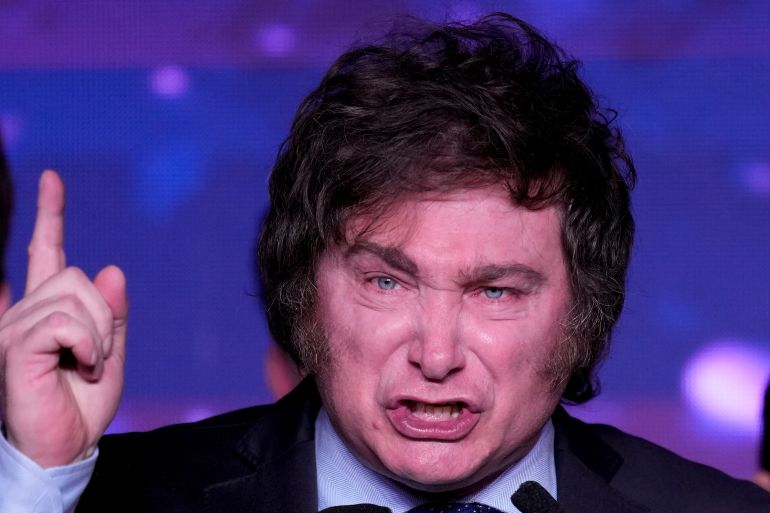Who is Javier Milei, Argentina’s far-right populist politician?
An admirer of Trump, the 52-year-old leader rocks Argentina’s political establishment after winning most votes in Sunday’s primary election.

Argentina’s presidential election race has an unpredictable X factor: Javier Milei, a fiery far-right populist who has emerged as the biggest winner in Sunday’s primary election.
The 52-year-old politician has exploited people’s disenchantment with the traditional political establishment, which has failed to address the perennial economic crisis in the Latin American nation.
Keep reading
list of 3 itemsArgentina’s yuan lifeline sign of brinksmanship between China, US
Voters express frustration ahead of Argentina primary election
With tousled hair, often sporting leather jackets and singing rock songs at his boisterous political rallies, Milei – an admirer of former US President Donald Trump – wants to purge politics of what he calls “thieves”.
The libertarian economist and author has proposed to dollarise the economy, shutter the central bank and shut down some ministries to shrink the state in steps to fix Argentina’s economy, which faces high inflation and currency devaluation amid dwindling reserves and a looming debt bomb.
Milei will be the frontrunner in the October presidential elections with centre-right coalition candidate Patricia Bullrich and the ruling coalition candidate Economy Minister Sergio Massa trailing in second and third place respectively.
“Everyone here is trying to recover from the shock of Sunday’s results. People here cannot believe it,” Al Jazeera’s Teresa Bo reported from Argentina’s capital, Buenos Aires, on Monday morning.
She said the results reflect voters’ frustrations with the persistent economic crisis in the country, which has resulted in “disenchantment … with traditional politicians”.
“When you go to very poor neighbourhoods in Argentina and you talk to people there, they tell you that they’re not afraid about what could happen if Javier Milei makes it to the presidency because they have already lost it all,” Bo said.
In a format that is unique in the region, Argentinians voted on Sunday for their favourite among 22 presidential candidates, with anti-establishment Milei taking the top spot at more than 30 percent with 93 percent of votes counted.
“Today we took the first step toward the reconstruction of Argentina,” Milei said celebrating the results. “A different Argentina is impossible with the same people as always.”
Milei, who has been a lawmaker in the lower house of Argentina’s Congress since 2021, did not have a competitor in the presidential primary of his Liberty Advances party.
Bullrich, 67, had about 28 percent of the vote and 51-year-old lawyer and incumbent minister Massa was in third with about 27 percent.
Deeply unpopular President Alberto Fernandez is not seeking re-election as year-on-year inflation runs at 115 percent, poverty has soared and the value of the peso has plummeted.
Who is Javier Milei?
Milei has shot from relative obscurity a few years ago to now polling at one-third of the vote. His combative, rock-style rallies appeal to voters angry at high inflation and rising poverty.
“Milei is a phenomenon,” said Benjamin Gedan, director of the Latin America and Argentina programmes at Washington-based think tank the Wilson Center, adding that his rise had rattled the two main political blocs – the governing Peronist coalition, now called Union por la Patria, or Union for the Homeland, and conservative opposition bloc, called Juntos por el Cambio, or Together for Change.
“His plague-on-both-your-houses message resonates among voters fed up with traditional political parties. And there are legions of these voters.”
In his closing campaign event this week, Milei rocked into an arena, singing and surrounded by cheering fans. He railed against the political elite who he called “robbers” taking money out of voters’ pockets.
“We are coming to defend against the looters of this system, which only benefits the political thieves,” he shouted at the joyful crowd as they chanted “freedom, freedom,” a reference to his party’s name La Libertad Avanza.
What are his policies?
Milei has pledged to “blow up” the political status quo, shutter the central bank, dollarise the economy and massively shrink the state – ideas that have resonated with many voters, especially young voters, after years of economic decline.
A former small-time rock musician and athlete, Milei opposes abortion and supports gun rights. He has criticised worker-friendly labour laws as a “cancer,” said the state is the “basis of all problems,” and praised US gangster Al Capone as a hero.
Milei’s rise reflects a wider regional trend in recent years that has seen Latin American politicians outside the mainstream and pledging to break up the status quo gain prominence in Brazil, Colombia, Peru and Chile.
“People are fed up with politicians,” said Adriano Gabriel Zoccola, a 31-year-old lawyer from Buenos Aires who supports Milei because of his economic proposals and plans to slash government spending and cut the number of ministries.
“If Argentina is going to have real change, something completely different has to emerge. I think that Javier is the right person,” added Zoccola, who said he had previously voted for Together for Change.
Opponents say Milei’s proposals are unrealistic. That includes the plan to dollarise the economy, something most Argentines oppose despite the rapid depreciation of the peso currency and high inflation. A dollar-peso peg introduced for similar reasons in the 1990s brought short-term benefits but ended in an ugly devaluation.
Successive governments have failed to address the structural issues facing the economy, as it has defaulted on its loans to International Monetary Fund (IMF) several times.
The current crisis was exacerbated by the COVID-19 pandemic and Russia’s invasion of Ukraine, which badly affected its economy as food and energy prices went up.
At Milei’s electoral headquarters in downtown Buenos Aires, party leaders were ecstatic while people celebrated outside, expressing optimism that their candidate’s support would only grow in the run-up to October 22 election.
“I like his ideas about freedom. His ideas don’t scare me. People are free to choose what they want,” said Orlando Sanchez, 26, a retail worker.
“People are clearly tired of politics, being constantly lied to.”